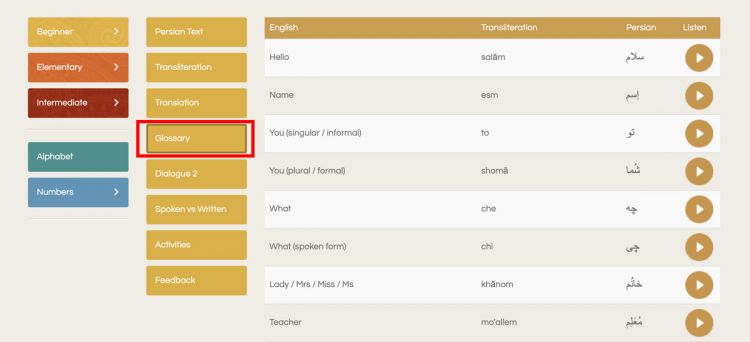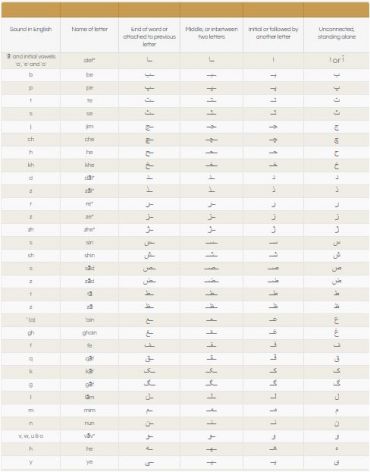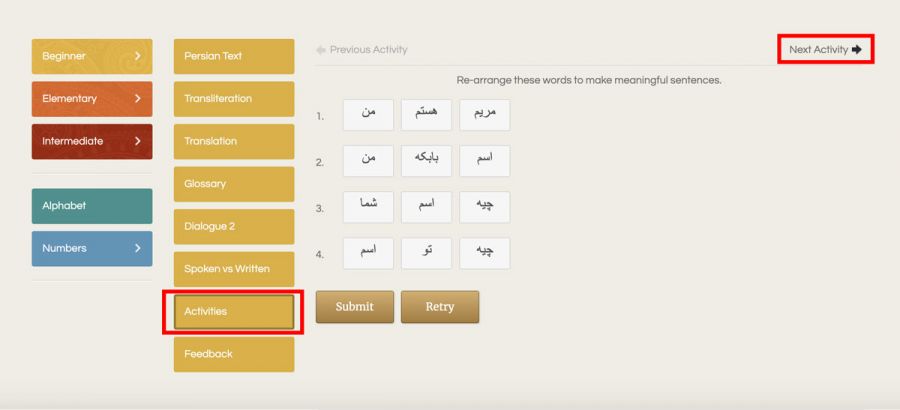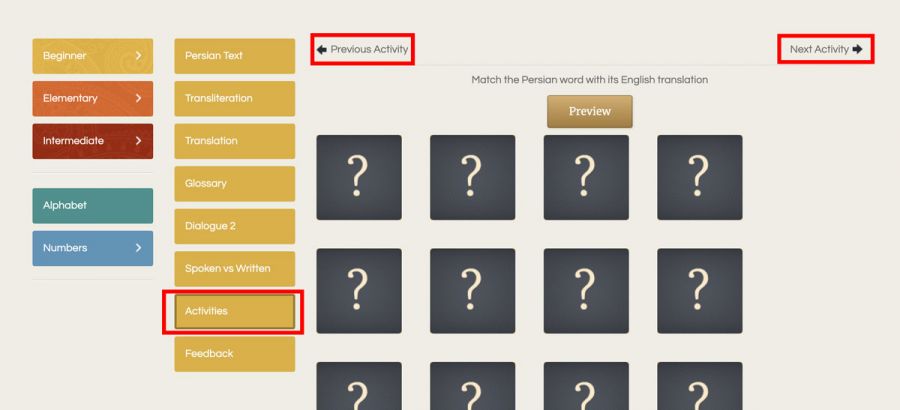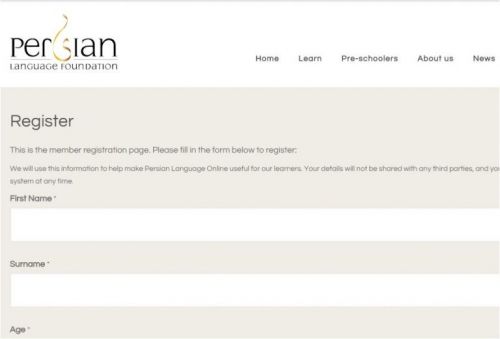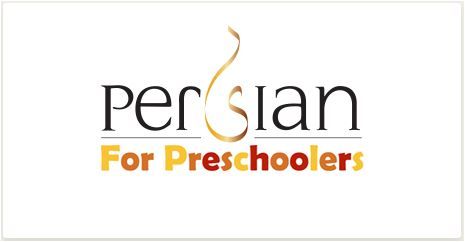
Project 6060 – Lesson 7
EN
FR
ES
FA
DIALOGUE 1
DIALOGUE 1
DIÁLOGO 1
مُکالِمه یِکُم
-
EN
Lesson 7
What day is it today?
***
Transliteration of Dialogue 1
jān: telviziyon chi dāre?
minā: emruz chand shanbast?
jān: chārshanbe.
minā: alān film dāre.
jān: futbāl nadāre?
minā: na. fardā futbāl dāre.
jān: jom’e chi dāre?
minā: jom’e tu irān tatile. telviziyon film-e komedi dāre.
jān: che ruzi akhbār dāre.
minā: har ruz akhbār dāre.
jān: rāsti, diruz kojā budi?
minā: diruz se shanbe bud; dāneshgāh budam.
jān: ākhare hafte kojāyi?
minā: fardā o pas fardā khuneam.Translation of Dialogue 1
John: What is there on TV?
Mina: What day is it today?
John: Wednesday.
Mina: There is a film on now.
John: Is there football on?
Mina: No. There is football on tomorrow.
John: What’s on on Friday?
Mina: Friday is holiday in Iran. There are comedy films on TV.
John: What day is the news on?.
Mina: The news is on every day.
John: By the way, where were you yesterday?
Mina: Yesterday it was Tuesday. I was at university.
John: Where are you this weekend?
Mina: I’m at home tomorrow and the day after tomorrow. -
FR
Leçon 7
Quel jour sommes-nous?
***
Translitération de Dialogue 1
jān: telviziyon chi dāre?
minā: emruz chand shanbast?
jān: chārshanbe.
minā: alān film dāre.
jān: futbāl nadāre?
minā: na. fardā futbāl dāre.
jān: jom’e chi dāre?
minā: jom’e tu irān tatile. telviziyon film-e komedi dāre.
jān: che ruzi akhbār dāre.
minā: har ruz akhbār dāre.
jān: rāsti, diruz kojā budi?
minā: diruz se shanbe bud; dāneshgāh budam.
jān: ākhare hafte kojāyi?
minā: fardā o pas fardā khuneam.Traduction de Dialogue 1
John: Qu'y a-t-il à la télévision?
Mina: Quel jour sommes-nous aujourd'hui?
John: Mercredi.
Mina: Il y a un film en ce moment.
John: Est-ce qu'il y a du football?
Mina: Non. Il y a du football demain.
John: Qu'est-ce qui se passe vendredi?
Mina: Le vendredi est un jour férié en Iran. Il y a des films d'humour à la télévision.
John: Quel jour est la nouvelle?
Mina: Les nouvelles sont chaque jour.
John: Au fait, où étais-tu hier?
Mina: Hier c'était mardi. J'étais à l'université.
John: Où es-tu ce week-end?
Mina: Je suis chez moi demain et après-demain. -
ES
Lección 7
¿Que día es hoy?
***
Transcripción de Diálogo 1
jān: telviziyon chi dāre?
minā: emruz chand shanbast?
jān: chārshanbe.
minā: alān film dāre.
jān: futbāl nadāre?
minā: na. fardā futbāl dāre.
jān: jom’e chi dāre?
minā: jom’e tu irān tatile. telviziyon film-e komedi dāre.
jān: che ruzi akhbār dāre.
minā: har ruz akhbār dāre.
jān: rāsti, diruz kojā budi?
minā: diruz se shanbe bud; dāneshgāh budam.
jān: ākhare hafte kojāyi?
minā: fardā o pas fardā khuneam.Traducción de Diálogo 1
John: ¿Qué hay en la televisión?
Mina: ¿Qué día es hoy?
John: Miércoles.
Mina: Hay una película ahora.
John: ¿Hay fútbol?
Mina: No. Mañana hay fútbol.
John: ¿Qué pasa el viernes?
Mina: El viernes es feriado en Irán. Hay películas de comedia en la televisión.
John: ¿Qué día son las noticias?
Mina: La noticia está en todos los días.
John: Por cierto, ¿dónde estabas ayer?
Mina: Ayer fue martes. Estaba en la universidad
John: ¿Dónde estás este fin de semana?
Mina: Estoy en casa mañana y pasado mañana. -
FA
درس هفتم
امروز چند شنبه است؟
***
متن فارسی مُکالمه اوّل
جان: تلویزیون چی داره؟
مینا: امروز چند شنبه است؟
جان: چهارشنبه.
مینا: الان فیلم داره.
جان: فوتبال نداره؟
مینا: نه، فردا فوتبال داره.
جان: جمعه چی داره؟
مینا: جمعه تو ایران تعطیله. تلویزیون فیلم کمدی داره.
جان: چه روزی اخبار داره؟
مینا: هر روز اخبار داره.
جان: راستی، دیروز کجا بودی؟
مینا: دیروز سه شنبه بود. دانشگاه بودم.
جان: آخر هفته کجایی؟
مینا: فردا و پس فردا خونه ام.
DIALOGUE 2
DIALOGUE 2
DIÁLOGO 2
مُکالِمه دُوُّم
-
EN
Transliteration of Dialogue 2
mahyār: emruz chand shanbast?
navid: emruz jom’ast.
mahyār: che ruzi kelās-e fārsi dārim?
navid: yek shanbe.
mahyar: fardā yek shanbast?
navid: na fardā shanbast. kelās-e fārsi pas fardāst.Translation of Dialogue 2
Mahyar: What day is it today?
Navid: Today is Friday.
Mahyar: What day do we have Persian class?
Navid: Sunday.
Mahyar: Is it Sunday tomorrow?
Navid: No. Tomorrow it is Saturday. Persian class is the day after tomorrow. -
FR
Translitération de Dialogue 2
mahyār: emruz chand shanbast?
navid: emruz jom’ast.
mahyār: che ruzi kelās-e fārsi dārim?
navid: yek shanbe.
mahyar: fardā yek shanbast?
navid: na fardā shanbast. kelās-e fārsi pas fardāst.Traduction de Dialogue 2
Mahyar: Quel jour sommes-nous aujourd'hui?
Navid: Nous sommes vendredi aujourd'hui.
Mahyar: Quel jour avons-nous cours de persan?
Navid: Dimanche.
Mahyar: C'est dimanche demain?
Navid: Non. Demain c'est samedi. La classe de persan est l'après-demain. -
ES
Transcripción de Diálogo 2
mahyār: emruz chand shanbast?
navid: emruz jom’ast.
mahyār: che ruzi kelās-e fārsi dārim?
navid: yek shanbe.
mahyar: fardā yek shanbast?
navid: na fardā shanbast. kelās-e fārsi pas fardāst.Traducción de Diálogo 2
Mahyar: ¿Qué día es hoy?
Navid: Hoy es viernes.
Mahyar: ¿Qué día tenemos clase persa?
Navid: Domingo.
Mahyar: ¿Es domingo mañana?
Navid: No. Mañana es sábado. La clase persa es pasado mañana. -
FA
متن فارسی مُکالِمه دُوُّم
مهیار: اِمروز چند شنبه است؟
نوید: اِمروز جُمعه است؟
مهیار: چه روزی کلاس فارسی داریم؟
نوید: یک شنبه.
مهیار: فَردا یک شنبه است؟
نوید: نه فردا شنبه است. کلاس فارسی پس فرداست.
DIALOGUE 3
DIALOGUE 3
DIÁLOGO 3
مُکالِمه سِوُّم
-
EN
Transliteration of Dialogue 3
mehrdād: emruz chand shanbast?
rāmin: panj shanbe.
mehrdād: che khub. fardā jom’ast. fardā ta’tile.Translation of Dialogue 3
Mehrdad: What day is it today?
Ramin: Thursday.
Mehrdad: Nice. Tomorrow is Friday. Tomorrow is holiday. -
FR
Translitération de Dialogue 3
mehrdād: emruz chand shanbast?
rāmin: panj shanbe.
mehrdād: che khub. fardā jom’ast. fardā ta’tile.Traduction de Dialogue 3
Mehrdad: Quel jour sommes-nous aujourd'hui?
Ramin: Jeudi.
Mehrdad: Bien! Demain c'est vendredi. Demain est un jour férié. -
ES
Transcripción de Diálogo 3
mehrdād: emruz chand shanbast?
rāmin: panj shanbe.
mehrdād: che khub. fardā jom’ast. fardā ta’tile.Traducción de Diálogo 3
Mehrdad: ¿Qué día es hoy?
Ramin: Jueves.
Mehrdad: ¡Qué bien! Mañana es viernes. Mañana es un día festivo. -
FA
متن فارسی مُکالِمه سِوُّم
مهرداد: اِمروز چند شنبه اَست؟
رامین: پنج شنبه.
مهرداد: چه خوب. فردا جمعه است. فردا تعطیله.
-
EN
Spoken vs Written
Most Persian words take the same form whether they are written or spoken, but not all. The table below shows you those words and phrases from this lesson that vary depending on whether they are spoken or written. Beneath the table is this lesson’s main dialogue given in its written form (although this written form would rarely ever be used in spoken conversation).
-
FR
Parlée vs. Écrite
La plupart des mots persans prennent la même forme, qu’ils soient écrits ou parlés, mais pas tous. Ci-dessous, un tableau vous montre les mots et les phrases de cette leçon qui varient selon qu’ils sont parlés ou écrits. Sous le tableau, le dialogue principal de cette leçon est donné sous forme écrite (bien que cette forme écrite soit rarement utilisée dans une conversation orale).
-
ES
Hablado vs. Escrito
La mayoría de las palabras persas toman la misma forma ya sea que estén escritas o habladas, pero no todas. A continuación, una tabla muestra las palabras y frases de esta lección que varían según sean habladas o escritas. Debajo de la tabla se encuentra el diálogo principal de esta lección en su forma escrita (aunque esta forma escrita rara vez se usará en una conversación hablada).
-
FA
گُفتاری دَربرابر نِوِشتاری
اکثر واژِگان فارسی – اما نه همه آنها – هَم در گُفتار و هَم در ِنِوشتار ، یک شکل ثابت دارند. در جَدوَل زیر، کلمات و عبارات این درس هم در صورت گفتاری و هم نوشتاری نشان داده شده اند. در زیر جدول ، مکالمه این درس بصورت کامل در شکل نوشتاری و بیان رسمی تکرار شده است. اگرچه باید توجه داشت که این شکل به ندرت در محاورات و مکالمات گُفتاری روزمره به کار می رود.
جان: تلویزیون چه دارد؟
مینا: امروز چند شنبه است؟
جان: چهارشنبه.
مینا: الان فیلم دارد.
جان: فوتبال ندارد؟
مینا: نه، فردا فوتبال دارد.
جان: جمعه چه دارد؟
مینا: جمعه تو ایران تعطیل است. تلویزیون فیلم کمدی دارد.
جان: چه روزی اخبار دارد؟
مینا: هر روز اخبار دارد.
جان: راستی دیروز کجا بودی؟
مینا: دیروز سه شنبه بود. در دانشگاه بودم.
جان: آخر هفته کجا هستی؟
مینا: فردا و پس فردا در خانه هستم.
jān: telviziyon che dārad?
minā: emruz chand shanbe ast?
jān: chehārshanbe.
minā: alān film dārad.
jān: futbāl nadārad?
minā: na. fardā futbāl dārad.
jān: jom’e che dārad?
minā: jom’e tu irān tatil ast. telviziyon film-e komedi dārad.
jān: che ruzi akhbār dārad.
minā: har ruz akhbār dārad.
jān: rāsti, diruz kojā budi?
minā: diruz se shanbe bud; dar dāneshgāh budam.
jān: ākhare hafte kojā hasti?
minā: fardā va pas fardā dar khāne hastam.

